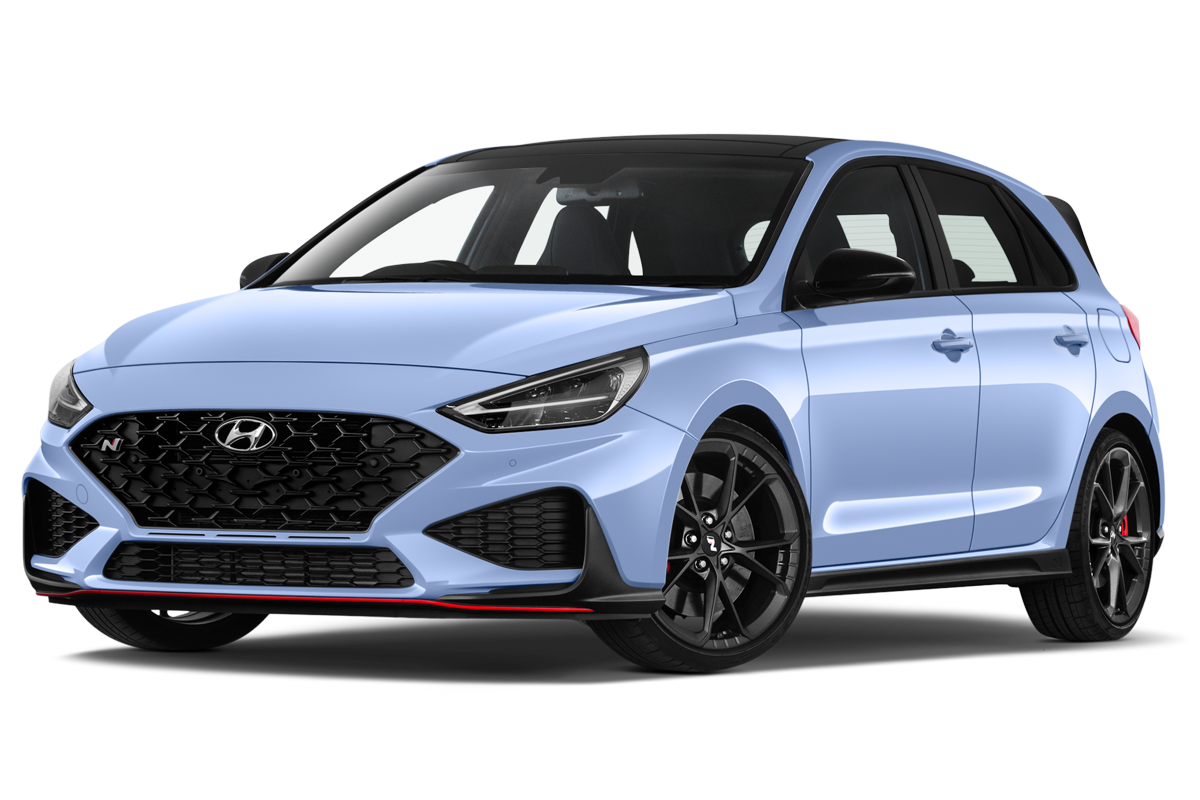The Greenest…
1.0T GDi SE Connect 5dr DCT

List Price
£22,710 - £37,135
Acceleration (0-62mph)
5.4 - 11.2 seconds
Top speed
122 - 155 mph
Engine Power
120 - 280 bhp
CO2 Emissions
120 - 191 g/km
Fuel Economy (Combined)
33.6 - 53.3 mpg
Well equipped; spacious interior with a quality feel; economical running costs.
Poor rear visibility; steering can feel vague.
The Hyundai i30 has been reborn, with a more stylish exterior, a more spacious interior and with more economical running costs. Its predecessor was popular; this newby is likely to be more so. The Hyundai i30 is a well equipped family car, with efficient and clean engines across the range (but particularly so with the 1.6 CRDi diesels), the Hyundai i30 compares well with its main competitors in the small family car sector – namely the Focus, Golf and Mazda3. It is competitively priced and carries the generous Hyundai five year warranty; the Koreans are really upping their game these days, and it certainly shows in this car.
The Hyundai i30 has a good range of engines available, both diesel and petrol. Diesel choices are 1.4 litre (88 bhp or 98 bhp) and 1.6 litre (108 bhp or 126 bhp). The 1.4 litre will accelerate from 0-62mph in 13.5 seconds, while the 1.6 can do it in 10.7 seconds. If you are more of a petrol person you can select from, amongst others, 1.4 litre (99 bhp) or a 1.6 litre (118 bhp). It’s to be expected that Hyundai i30 diesels will be the most popular. A six speed manual gearbox is fitted as standard, although both the 1.6 litre petrol and diesel engines can come with an automatic gearbox if wanted.
A trip in the Hyundai i30, with its multi-link suspension, will not leave you saddle-sore, but neither will it leave you under the impression there are no longer any potholes on the road. Exterior noise is kept to a minimum, and all things considered a long distance drive on the motorways will be a comfortable enough experience. The Hyundai i30 has a Flex Steer system which offers the choice of Comfort, Normal and Dynamic modes – in Comfort mode Hyundai i30’s steering is light, becoming heavier moving through the other two choices. Despite this, the rather lifeless steering is not exactly satisfying for a driver wanting a more than unexciting driving experience.
The new Hyundai i30’s styling is a step up from its predecessor, and carries itself with aplomb. Its headlights are distinctive and the bodywork is curvy and stylish. It is similar in style to the i40 – just smaller.
Hyundai have upped their game with the new look i30 interior. Hard plastics have given way to a softer, more luxurious feel; and the dash has a new refinement to it. Controls are placed within easy reach, giving the added bonus of extra storage in front of the gear lever. Although the front to rear wheel distance remains the same, this new version is wider and consequently more comfortable for a third rear seat passenger. The Hyundai i30 leg room is adequate but not particularly generous; head room for front and rear passengers is ample. Hyundai have outdone some of their rivals (the Focus, Mazda3 and Golf to name a few) with luggage space provision – no one is likely to complain at the 378 litres on offer, and the rear seats fold flat making a total of 1316 litres available. But of course, once you utilise this, your passengers will have to be left at home.
Hyundai i30 equipment levels vary across the four trim levels available. Entry level Classic is not short of kit, with Bluetooth (with voice recognition), LED daytime running lights, air conditioning, multi function steering wheel, adjustable driver’s seat, and heated, electrically operated front mirrors. Next level up Active has alloys, cruise control, rear parking sensors and electric rear windows; while the Style offers 16 inch alloys, dual-zone climate control, front parking sensors, rain-sensing wipers, automatic headlights and electrically folding mirrors. Finally, as its name suggests, the Style Nav has touch screen sat-nav and rear view cameras for parking guidance.
Hyundai predict that the i30 will be a five star performer in the EuroNCAP crash test rating, although it has not yet been tested; and with Hyundai’s good safety record there is no reason to doubt this. Safety features include brake and hill assist, anti lock brakes, electronic and vehicle stability management system, and flashing (in an emergency stop) brake lights. The Hyundai i30 has six airbags plus an optional knee height bag.
Owning a Hyundai i30 will not be such a financial shock to the system as others in its class – with one of its diesel choices giving a stated 74.3 mpg and with low carbon emissions it can be very wallet-friendly. All through the range, in fact, the Hyundai i30 should generate relatively low running costs. Hyundai offer a five-year warranty which adds to the financial appeal; and servicing is likely to be affordable. It is unlikely that there would be too much problem selling on, appealing, as the Hyundai i30 does, to the small family car driver.
Reviewed by cars2buy
1.0T GDi SE Connect 5dr DCT
2.0T GDi N Performance 5dr DCT
1.0T GDi SE Connect 5dr
2.0T GDi N Performance 5dr DCT